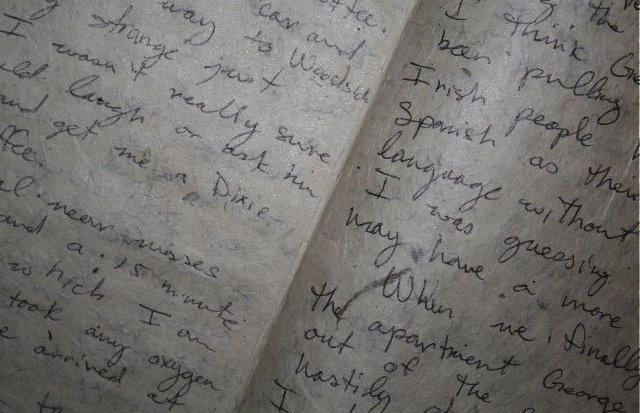martes, 26 de agosto de 2008
Is this our future?
Is the Society in "Harrison Bergeron" a possibilty to what we will become? Why or why not?
lunes, 25 de agosto de 2008
Hyperbole
What's striking about Vonnegut's story is its hyperbole: equality is enforced in every identifiable respect. What are the appropriate limits to ensuring equality and why?
Being Shot Down
What is the meaning of Harrison and the ballerina being shot down by Diana Moon Glampers, the Handicapper General? What are the suggestions of her name?
Harrison and the Ballerina
What is the meaning of Harrison's and the ballerina's flight-like dance and kissing? What is meant by the statement, "not only were the laws of the land abandoned, but the law of gravity and the laws of motion as well" (12)?
Harrison and the Musicians
What is the significance of Harrison telling the musicians, "I'll make you barons and dukes and earls" (12)? What different values underlie such ennoblement? What role do beauty and aesthetics play in Harrison's rebellion?
Harrison on TV
What is the significance of the real Harrison suddenly appearing on the TV set where his escape from prison was being reported? Why does he repeatedly say, "I am the Emperor!" (11)? Is Vonnegut suggesting a return to feudalism and its aristocratic political institutions?
A Threat to Society
Why is Harrison Bergeron such a threat to society? How old is he? How has he been "handicapped"?
TV, George, and Hazel
How are George and Hazel Bergeron described? What sort of life do they lead? What is Vonnegut parodying here? What does the story warn against? To what extent do television, radio, and the mass media generally function like George's mental handicap radio?
Mediocrity is needed too
Former U.S. Senator from Nebraska Roman Hruska was (in)famous for saying, during the hearing for a poorly regarded (and ultimately unsuccessful) nominee to the U.S. Supreme Court: "Well, mediocrity should be represented in the Court, too." How does that sort of thinking relate to what Vonnegut's getting at with this story?
Is Equality Equal?
How is the conception of equality related to basic forms of commercial life such as the commodity and money and the social roles of buyer, seller, and wage-laborer? Do capitalist social forms inevitably produce tension around equality by spreading an anti-aristocratic ideology of equality, egalitarianism, that can provoke movements for social equality such as the civil rights movement or the feminist movement, while at the same time continually creating inequalities (at least of income and wealth)? Might the reliance in the story on the government to enforce equality point to such an irresolvable tension?
Trends in Reality
What actual developments, policies, trends involving government-enforced equalizing, "handicapping," in America might Vonnegut be parodying in "Harrison Bergeron"? What conceptions of equality motivate such policies and trends?
Threats
What are the functions of the agents of "the United States Handicapper General" (7)? What threats to society do such agents combat? What political processes could lead to such absurdities? How is radical mediocrity achieved and enforced?
Change in American Society
Are such changes impossible under American capitalism or are they likely results of just such a system? What human tendencies underlie the sort of world described by Vonnegut? Are these the end results of the progressive spread of middle class greed, envy, and pettiness? What does the experience of America in the late twentieth century suggest? What does the popularity of shows like Oprah's and Rosie O'Donnell's hint at? Why are such figures role models? What is given center stage in such shows? What about Barbie dolls redesigned to look more like "real" people? How about certain trends in elementary/secondary and even higher education (e.g. grade inflation)? What of practices in organized sports for youth such as giving equal playing time regardless of ability, of not keeping score (and acting as if one didn't know what the score was); of giving medals to players on teams regardless of how they finished in their league?
The Future
What are the implications of the opening sentence, "The year was 2081, and everyone was finally equal" (7)? What happened? Are capitalism and American democracy dead? Did Soviet-style totalitarianism finally prevail? What does the elimination of advantages, difference, and competition suggest concerning the nature of the changes that have taken place?
The Dance
What is the significance of the dance that Harrison performs with the ballerina? How does the style in which the story is written change in this passage?
Hazel and George
Consider the characters of Hazel and George. Why isn’t Hazel handicapped? How does George seem to feel about his handicaps?
Equality Achieved
What is the state of U.S. society as described in the first paragraph of the story? How has “equality” been achieved?
Suscribirse a:
Comentarios (Atom)
